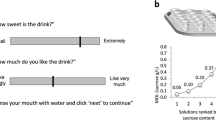Abstract.
Rationale: When paired with morphine, rats suppress their intake of saccharin solution, but not a less palatable salt solution. The reward comparison hypothesis argues that when a taste is paired with morphine, intake of the solution is expected to decrease as the palatability of the taste increases. Therefore, morphine should more effectively suppress intake of salt solution in rats that are conditioned in a sodium-deprived state than in rats that are conditioned in a sodium-replete state. Objectives: The present experiments evaluated the effect of furosemide-induced sodium deprivation on morphine and lithium-induced salt (experiment 1) and saccharin (experiment 2) avoidance and salt taste reactivity (experiment 4). Methods: Rats were injected with furosemide or saline 21 h prior to access to salt solution (experiments 1 and 3) or saccharin solution (experiment 2). Immediately following access to the solution, the rats were injected with saline, morphine or lithium chloride solution. In experiments 1 and 2, a two-bottle test measured the strength of the taste preference/avoidance. In experiments 3 and 4, the taste reactivity test evaluated the furosemide-induced unconditional palatability changes for salt solution (experiment 3) and the conditional palatability changes for salt previously paired with morphine or lithium (experiment 4). Results: Sodium depletion induced by furosemide pretreatment conditionally enhanced subsequent preference for salt solution using both the taste avoidance test (experiment 1) and the taste reactivity test (experiment 4). Salt-lithium associations, but not salt-morphine associations, suppressed salt preference. However, the salt-morphine (40 mg/kg) association enhanced salt preference (in both experiments 1 and 4) when rats were conditioned in a sodium-deprived state. In experiment 2, morphine-saccharin associations resulted in conditioned saccharin avoidance regardless of pretreatment condition. Conclusions: When the palatability of salt was enhanced by sodium depletion, morphine produced a mild conditioned salt preference in both a two-bottle preference test and enhanced ingestion reactions in the taste reactivity test, but morphine produced conditioned saccharin avoidance.
Similar content being viewed by others
Author information
Authors and Affiliations
Additional information
Electronic Publication
Rights and permissions
About this article
Cite this article
Sorge, R.E., Fudge, M.A. & Parker, L.A. Effect of sodium deprivation on morphine-and lithium-induced conditioned salt avoidance and taste reactivity. Psychopharmacology 160, 84–91 (2002). https://doi.org/10.1007/s00213-001-0956-3
Received:
Accepted:
Issue Date:
DOI: https://doi.org/10.1007/s00213-001-0956-3




